
The 2021 Hugo Awards were presented in a ceremony held today at DisCon III.
The Hugo voting statistics are here.
BEST NOVEL
Network Effect, Martha Wells (Tor.com)
BEST NOVELLA
The Empress of Salt and Fortune, Nghi Vo (Tor.com)
BEST NOVELETTE
Two Truths and a Lie, Sarah Pinsker (Tor.com)
BEST SHORT STORY
“Metal Like Blood in the Dark”, T. Kingfisher (Uncanny Magazine, September/October 2020)
BEST SERIES
The Murderbot Diaries, Martha Wells (Tor.com)
BEST RELATED WORK
Beowulf: A New Translation, Maria Dahvana Headley (FSG)
BEST GRAPHIC STORY OR COMIC
Parable of the Sower: A Graphic Novel Adaptation, written by Octavia Butler, adapted by Damian Duffy, illustrated by John Jennings (Harry N. Abrams)
BEST DRAMATIC PRESENTATION, LONG FORM
The Old Guard, written by Greg Rucka, directed by Gina Prince-Bythewood (Netflix / Skydance Media)
BEST DRAMATIC PRESENTATION, SHORT FORM
The Good Place: Whenever You’re Ready, written and directed by Michael Schur (Fremulon / 3 Arts Entertainment / Universal Television, a division of Universal Studio Group)
BEST EDITOR, SHORT FORM
Ellen Datlow
BEST EDITOR, LONG FORM
Diana M. Pho
BEST PROFESSIONAL ARTIST
Rovina Cai
BEST SEMIPROZINE
FIYAH Magazine of Black Speculative Fiction, publisher Troy L. Wiggins, executive editor DaVaun Sanders, managing editor Eboni Dunbar, poetry editor Brandon O’Brien, reviews and social media Brent Lambert, art director L. D. Lewis, and the FIYAH Team.
BEST FANZINE
nerds of a feather, flock together, ed. Adri Joy, Joe Sherry, The G, and Vance Kotrla
BEST FANCAST
The Coode Street Podcast, presented by Jonathan Strahan and Gary K. Wolfe, Jonathan Strahan, producer
BEST FAN WRITER
Elsa Sjunneson
BEST FAN ARTIST
Sara Felix
BEST VIDEO GAME
Hades (Publisher and Developer: Supergiant Games)
LODESTAR AWARD FOR BEST YOUNG ADULT BOOK (not a Hugo)
A Wizard’s Guide to Defensive Baking, T. Kingfisher (Argyll Productions)
ASTOUNDING AWARD FOR THE BEST NEW WRITER, SPONSORED BY DELL MAGAZINES (not a Hugo)
Emily Tesh (2nd year of eligibility)
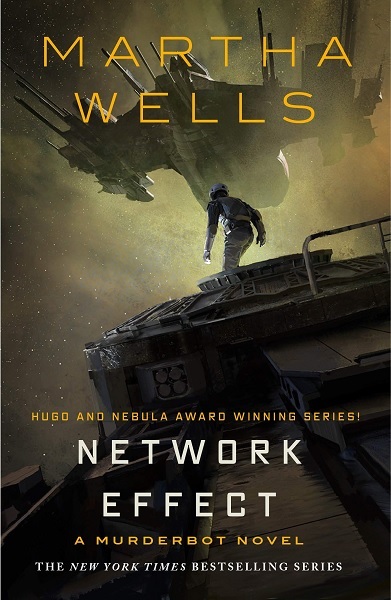
Network Effect by Martha Wells, art by Jaime Jones 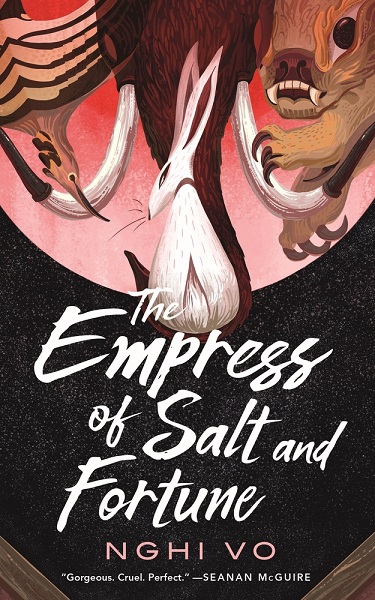
The Empress of Salt and Fortune by Nghi_Vo, art by Alyssa Winans 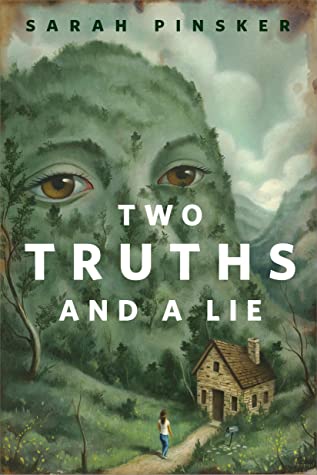
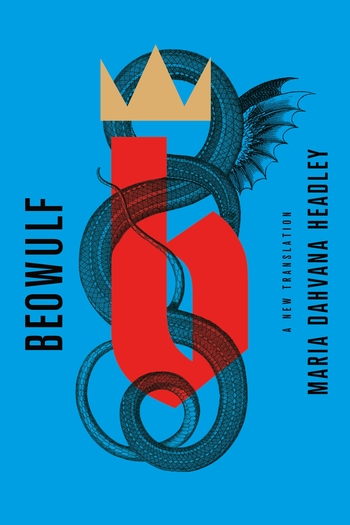
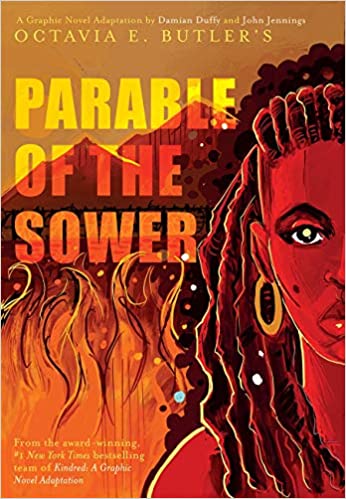


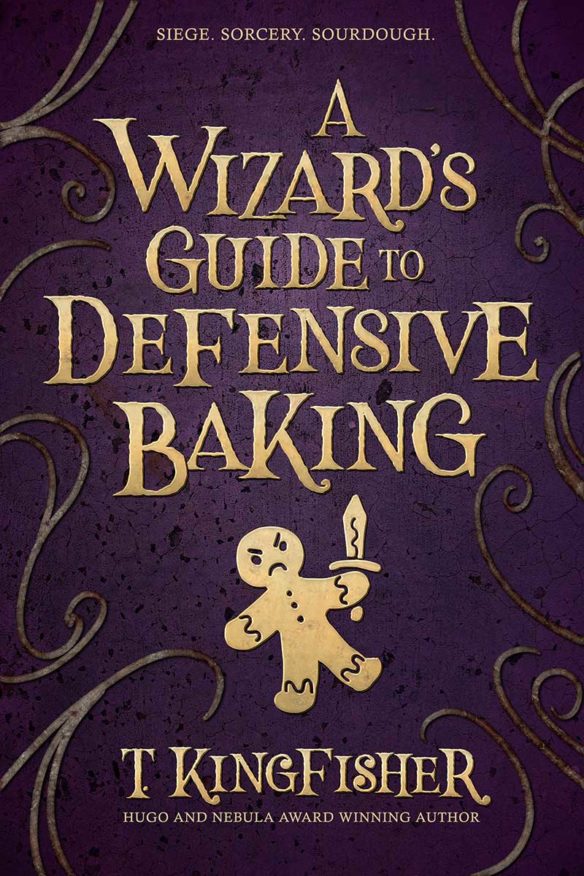
Discover more from File 770
Subscribe to get the latest posts to your email.

Congrats to all the winners, but… amI alone in thinking The Old Guard was a pretty mediocre action flick?
@Cliff you are not alone. I am of the opinion that Palm Springs was clearly superior to Old Guard and indeed should have won outright. YMMV.
I too was baffled by Old Guard winning. I fell asleep halfway in! I wasn’t sure what would win that category, but felt pretty certain it would be anything else.
I really liked The Old Guard. I’ve been meaning to read the comic.
@Miles
I’ll say Palm Springs was better than I expected.
I was also baffled by The Old Guard winning. It was fine, but I thought there were better films on the list.
I’ve noticed a definite trend toward finalists in various categories being either freely available or at least widely available during nomination time. Anything pricey or available on only one source seems to be skipped by the nominators unless the buzz is quite high. Palm Springs was only available on Hulu, for instance; while there were several Short and Long Form finalists available on Netflix and Disney+ so nominators could at least watch several programs for one subscription price.
Interesting to observe the effect of e-pluribus-hugo over the years (In its first year, its most notable effect was to disqualify Patrick N-H from the ballot, with some irony since it originated to some degree on Making Light.) This year Order of Pure Moon might have made Novella without it, but only in the newly created 6th place. In Graphic novel a tie for 6th was broken by it. In DP/Long Tenet took the new 6th place over Wolfwalkers and Bill and Ted which were on more nominating ballots, but only due to the re-categorization of the Mandalorian. A tie for 5th broken on fan writer.
But most interesting the Best Editor/Long where Weisskopf made the ballot’s 5th slot with a higher score than 5 other editors. She declined her nomination, presumably not too enthused with Discon3. I suspect some polarization played a role her, and he ballots were not shared with many of the other top scoring nominees. It’s an open question if this was the intent of e-pluribus or against its intent, to alter the results due to natural polarizations rather than organized blocs.
Special congrats to Sara Felix, noting that other candidates might consider doing a cover for ‘BEAM’, since hers already won an award…
Nic Farey: The power behind the throne!
Brad Templeton: It’s an open question if this was the intent of e-pluribus or against its intent, to alter the results due to natural polarizations rather than organized blocs.
The purpose of EPH is to prevent small groups of like nominators – regardless of whether they are natural or organized – from taking over the whole ballot, while still giving them proportional representation on the ballot. In this case, EPH worked exactly as intended.
Wanted to mention that in addition to slime mold details, we got a Sleestak shout-out, which my wife and I appreciated.
@JJ
So intent of EPH was to put Toni Weisskopf on the ballot when she would not have been on the ballot without it?
She did withdraw later but that was after the nominating process.
@Brad Templeton
So you’re saying Tenet beat out Wolfwalkers because of technicalities in the voting system?
…
Burn it all down!!!
When EPH was being discussed, it was pointed out that it would advantage the sole choice of an outlying bloc — such as, in this case, Weisskopf with Baen fandom. Consensus was that advantaging nominees from a larger number of fandom groups was a feature rather than a bug.
Martin Easterbrook: So intent of EPH was to put Toni Weisskopf on the ballot when she would not have been on the ballot without it?
EPH has no “intent” with regard to any individual or work. EPH’s intent is that the choices of nominators are proportionally represented on the ballot, if a sufficient number of them support a nominee to warrant representation.
The point totals and elimination effects show that a large number of people had several of the other finalists on their ballots. Those nominators are represented with several slots. So it’s fair that the significant number of people who nominated only Weisskopf are represented with one slot on the ballot.
Martin Easterbrook on December 19, 2021 at 4:57 pm said:
Insofar as Ms Weisskopf must have represented the tastes of a reasonably large and at least moderately under-represented-on-the-ballot group of nominators, yes, that’s exactly what it was supposed to do.
This effect, and the possibility of an outcome like this, was discussed at length during the EPH debate, and was generally considered a big positive. EPH doesn’t judge; it simply increases the diversity of contributions to the final ballot.
Re EPH and Editor, Long Form: I am looking for the nomination counts, EPH reduction scheme, or whatever, and find nothing other then the discussion here. Is there a place — I tried an internet search and found nothing — where the background may be read?
@George Phillies: The last link at The Hugo Awards’ web site’s results post is to the nomination details PDF. Currently the nomination detail PDF is here.
http://www.worldcon.fi/wsfs/hugo-new/ has some information.
Technical details are at Bruce Schneier’s website
@Xtifr
EPH is a mathematical process which is reasonably well behaved for a limited region of input data. Like any other such process it can be unpredictable outside that region and may indeed turn round to bite you very badly. Several of this year’s categories are obviously on the boundaries of the ‘safe’ region. I think many people would feel that the behaviour we are already seeing is different enough from what they were expecting to make it sensible to review things further.
As you rightly point out EPH does not produce results that can be defined as correct in any objective sense. It is simply a mathematical transformation from input data to output data. Sometimes people will prefer the output data sometimes they would have preferred the input data.
Likewise the output is diverse in a mathematical sense not in any social or ethical sense. Indeed for a diverse set of inputs (a large set of nominees with roughly equal support) the results from this year indicate it will promote some nominees with smaller levels of support. In the real world this might be a group that have discovered something new which should be promoted or it might be the smaller numbers in the ‘tail’ of any voting population, the group often colloquially described as “batshit crazy” who are likely to be promoting something extreme and very much anti diversity as we would understand it.
The maths here is really hard and I don’t claim to be able to entirely understand it or to predict what it will do. However I do have experience of implementing maths I don’t understand in software, often when it has insufficient or zero test data because nobody I had access to understands it well enough to produce that test data. The result is often an unpleasant surprise (Thankfully I’ve never been pushed to do that outside of non critical experimental prototype systems).
On a more practical level, for the current year who checked these results and what checking did they do? As a minimum of I would hope data from l previous years was run through the system and the results compared to the original runs. Is there a test plan for the software? These are all things we would demand if we had bought the software which implements this. This is too important not to scrutinize properly.
If we are going to put any piece of technology, which in all honesty few of us understand, in such a mission critical role I think it is good practice to have it reviewed by someone independent who has the skills to do so.
Martin Easterbrook: Several of this year’s categories are obviously on the boundaries of the ‘safe’ region. I think many people would feel that the behaviour we are already seeing is different enough from what they were expecting to make it sensible to review things further. The maths here is really hard and I don’t claim to be able to entirely understand it or to predict what it will do.
I disagree with you. I don’t see anything which is on the boundary of a “safe” region – and I don’t really understand what you mean by that.
I’m sorry if you don’t feel that you understand how EPH works, but a lot of Worldcon members do understand it, and have been watching the results closely for 4 years now. EPH is performing the way I expected… the way a lot of people expected. I think it’s doing what Worldcon members wanted it to do.
No, the results are not “correct in any objective sense” – but they are more fair than a straight nomination count, in terms of providing proportional representation to different subgroups of Worldcon fans – which was the goal of a lot of the people who participated in the process of the development of the EPH algorithm.
Well, I don’t pretend to understand the math, but it did seem odd to me that Piranesi ended up behind The City We Became despite appearing to consistently have more votes. But as I say, I don’t understand the math.
rochrist: it did seem odd to me that Piranesi ended up behind The City We Became despite appearing to consistently have more votes.
That’s on the final ballot, which uses an Australian (preference) ballot. EPH is only used on the nomination ballot.
Once Black Sun was eliminated from the tabulation, almost half of its votes went to The City We Became and the other half were split between Piranesi and The Relentless Moon, which put TCWB tied with Piranesi, and eliminated TRM. TCWB got ~250 of TRM’s votes, and Piranesi only got around ~150 of TRM’s votes.
In other words, Piranesi‘s support was deeper and more narrow, but TCWB’s support was wider and more shallow. And the Australian ballot recognizes wider support (among more people).
I’ve actually been very pleased with the results of EPH. It does not return the exact same results as counting just the nominations, especially in regard to tied nominations; but we knew that would be the effect going in. And we chose that effect over the vulnerability to slating efforts. I think it has had a minimal, and acceptable, impact on the nomination process.
There are a couple of nomination categories where I was confused: Graphic Story, Editor Short&Long, Pro Artist, Fancast, Fan Writer, and Video Game all seem to have had a seventh place with more points than the sixth, and Fan Artist has what looks like it should’ve been a sixth/seventh place tie. I’m sure I’m just misunderstanding something, though, I freely admit I’ve never managed to beat EPH past the dizziness cut-off for learning new things.
At each step in EPH, you pick one nominee to eliminate. This is done by taking the two nominees with the lowest point totals — but then, point total ceases to matter, the decider for which of the two is removed is the raw number of ballots each is on. So for example, Alasdair Stuart beat out James Nicoll in Best Fan Writer because he was on the ballots of 46 people to James’s 41. The various other cases you mention are resolved similarly.
The basic idea of EPH doesn’t really require math: if a candidate you nominated gets eliminated, your remaining nominations in the category get weighted slightly heavier, to increase the chance that something you like makes the ballot.
A grossly oversimplified example (and I’ll ignore issues with ties, which rarely come up in more realistic scenarios): three space opera fans and two cyberpunk fans are making nominations for a three item ballot. The space opera fans list the three best space operas, and the cyberpunk fans list the three best cyberpunk books.
Without EPH, we would have three space operas on the final ballot. But with EPH, first, a cyberpunk book is eliminated (losing 2-3), but now the cyberpunks’ remaining nominations are worth more, so a space opera gets eliminated! At this point, everyone’s votes are worth the same again (since everyone has lost a nominee), so another cyberpunk is eliminated, and the final ballot has two space operas and the last remaining cyberpunk! A result that more accurately reflects the tastes of the group as a whole, rather than being entirely dominated by a large subgroup.
Again, this was grossly oversimplified, but should at least give a feel for the concept, and why people like it.
While it’s true that in the more advanced discussions of EPH, its more subtle implications was discussed. However, at the same time it is clear that it was engendered by and the result of efforts to find ways to mitigate the effects of organized bloc voting. That it also mitigates more natural bloc voting I would not say was viewed by all as a feature. People voted for it not necessarily understanding all its math (as evidenced here) but because it was put forward as an answer to puppies. It is not at all clear to them if you had told them “As a result you will find that candidates would be pushed off the ballot in favour of a Baen editor who was booted from a GoH position at the Worldcon whose name appeared on far fewer nominating ballots because those who nominated her did not also nominate other leading nominees” that they would have said, “Yeah, that’s why I am supporting this.”
It was a very hard problem, and there is no one simple solution. EPH in the end didn’t do very much. The puppies were already defeated before it came into play, though it may have stopped them from coming back.
Brad Templeton: That it also mitigates more natural bloc voting I would not say was viewed by all as a feature. People voted for it not necessarily understanding all its math (as evidenced here) but because it was put forward as an answer to puppies. It is not at all clear to them
I think the only person you’re qualified to speak for is yourself, and you need to stop presuming to speak for other Hugo voters. I am friends with a lot of Hugo voters who all understand how EPH works and feel that the fact that it works on “natural” blocs as well as organized blocs is a feature, not a bug.
Brad Templeton: EPH in the end didn’t do very much. The puppies were already defeated before it came into play
What a bizarre thing to say. A lot of the Puppies openly admitted that the reason they were no longer willing to keep spending $40-50 to nominate in the Hugo Awards was because it was clear that they were only going to be able to get 1 or 2 things on the ballot in any given category. EPH is what defeated them.
Brad Templeton: Much like all cases involving eyewitnesses, I’ve found different people remember different claims for what EPH would accomplish. My residual memory of what was claimed is that it would keep a Puppy-style slating campaign from occupying all the slots in a category, and make it more likely that at least one or two non-slate picks would get on the final ballot. Naturally, people would have preferred a solution that flushed all the slate nominees, and they were disappointed there wasn’t one. But with EPH they could increase the chances of having something they wanted to give a Hugo to.
And EPH did a great deal to change the behavior of Vox Day, convincing him to slate only one or two items in a category in 2017. See Rabid Puppies 2017 Arrives. Most of those slated items would have made the ballot but for his incompetence in choosing a number of items that were ineligible.
I don’t actually disagree with your memory, Mike. Some people got into the weeds. A lot didn’t and just wanted a way out of slates. And some said there would be some unintended consequences, and some felt they were acceptable. What I was commenting on was the question of whether they were actually intended. They were anticipated, but my feeling is they were not intended. I think the intention was that we get back to something as close as what we had before, that people nominated what they liked, and the ones that got the most support among those nominators became the ballot. We would certainly not have passed EPH or 6 nominees except in response to the attack. Nobody could have gone into a business meeting declaring how the complex EPH formula would downrate candidates who were often nominated along with other similar candidates, and we really should do that.
Brad Templeton: We would certainly not have passed EPH or 6 nominees … we really should do that.
You have a long history of doing this on this blog. The arrogance is absolutely breathtaking.
There is no “We”. There is just you. That’s it. That’s the only person for whom you get to speak.
You seem to have this bizarre idea that you speak for the vast majority of Worldcon fans. I can guarantee you that you do not. Learn how to use the word “I” instead of the word “We”. Your presumption in continually speaking for others is just offensive.
Brad Templeton: Nobody could have gone into a business meeting declaring how the complex EPH formula would downrate candidates who were often nominated along with other similar candidates, and we really should do that.
Were you even at the Sasquan or MidAmeriCon II Business Meetings? (I don’t see your name on the membership lists for either of them, even as a Supporting member, quelle suprise.)
Because I was at the Business Meetings both of those years, and this aspect of EPH was very specifically discussed – we were even given a printed example at MACII.
If you don’t like EPH, you are certainly entitled to hold that opinion. But you don’t get to tell everyone else here what they think or know. And apparently there are a significant number of Worldcon members who know more about EPH and its passage than you do.
@JJ
Thank you for this. For two reasons.
Firstly my memory of the discussions about EPH here is that attempts to find out how the system was going to work exactly were met with ad hominem attacks. Whatever you may say this stuff is complicated and trying to think it through while someone is insulting you is enormously more difficult. Seeing the same thing aimed at others makes me more confident that I wasn’t (totally) overreacting.
Secondly the argument that ‘Everyone else can see this but you. There must be something wrong with you’ is dealt with quite comprehensively in a certain children’s story.
My memory of the discussion of side effects, while not complete, matches Brad’s description.
We now have examples of that type of side effect and the question we have to answer is whether they represent a bug or a feature.
Unsurprisingly it probably depends on what it has done to you. If your nomination has been pushed up one or two places, because for some reason the algorithm is seeing all the other nominations as a giant slate which is biased against you, then you are probably at least a little bit pleased.
However if you are the nominee below that, where all your nominators have behaved normally and entirely properly, then you are not going to be pleased to find yourself thrown off the ballot.
Our problem is that at we then have a nominee who can truthfully say that they have been unfairly treated. Even worse we have now seen this happen before and now can no longer say it is unexpected behaviour. For our own protection I think we may need to run this past a lawyer.
Martin Easterbrook: Firstly my memory of the discussions about EPH here is that attempts to find out how the system was going to work exactly were met with ad hominem attacks.
My memory of the discussions about EPH here is that attempts to find out how the system was going to work exactly were met with lengthy, in-depth explanations and lots of hashing-out to the nth detail. A lot of very patient people did a great deal of explaining, over and over again.
Martin Easterbrook: trying to think it through while someone is insulting you is enormously more difficult. Seeing the same thing aimed at others
If you consider me telling Mr. Templeton to stop speaking for other people as “insulting him,” then I think that indicates a privileged expectation that someone is entitled to speak for others – which, as I’ve indicated, I find deeply insulting.
Martin Easterbrook: Our problem is that at we then have a nominee who can truthfully say that they have been unfairly treated.
And here you are, saying “our problem”. I don’t agree that is “our problem”. It may be your problem – in which case, you should phrase it that way, instead of assuming that everyone has a problem with it just because you do.
Nominees are “unfairly treated” by being locked out by bloc voting. Finalists are “unfairly treated” by FPTP voting. Finalists are “unfairly treated” by RCV. (I recall a notorious incident where an author threw a massive hissy fit on Usenet and insisted that they’d won the Hugo because they had the most 1st-place votes in the first round.)
Any nominating and voting system we use is going to have its fair and unfair aspects. That is the nature of voting systems.
I’ve had works I favored pushed both up the longlist and down the longlist by EPH. Since I have never felt entitled to have my choices show up on the ballot, I consider these variances to be reflections of other peoples’ (also valid) choices and don’t feel hard done by. The whole point of EPH is to prevent the ballot from being locked up by one interest group to the exclusion of others.
Martin Easterbrook: For our own protection I think we may need to run this past a lawyer.
Surely you’re joking. There is no legal case here. The rules are clearly stated in the WSFS Constitution and scrupulously followed by the Hugo Administrators. Any Worldcon member who wants to see the tabulation done differently is welcome to bring their case for a rules change to the membership.
@JJ: I don’t interpret Brad’s “we” here as “the royal we”, but rather as “we the people at the WSFS Business Meeting”. I also didn’t get the impression from anything Brad wrote here implies that he “do[es]n’t like EPH”, only that certain aspects of it should perhaps have been discussed more, and that a lot of people didn’t understand it.
As I recall, there were a lot of different voting schemes being proposed at the time that had different sets of “bugs” and “features”, and were of varying mathematical complexity. A lot of folks I know did put the brainpower into understanding just how these systems worked, mostly the type who particularly like that kind of mental exercise or were very motivated to keep the Puppies out of control. A lot of people studied it just until they thought they could kind of understand it, and figured to ask more knowledgeable folks about it when nominating and voting time came (that’s me), and some people threw their hands up and figured they’d let other people sort it out. At no time did Brad claim that he was the only one who understood this; I know because I was present in discussions with Brad and several of his equally-smart friends about this.
FWIW, the effect of getting a plate of finalists that reflects a wider swath of the nominator community, while making sure that the overall most acceptable finalist wins in the end, is exactly how I saw EPH explained several times in the discussion before it was ratified.
At least for readers here, it shouldn’t be any surprise how EPH works. The whole Brian Z-debacle made sure it was explained a few thousand times – just for him. Then it was explained for several others too.
Janice Morningstar: I don’t interpret Brad’s “we” here as “the royal we”, but rather as “we the people at the WSFS Business Meeting”.
And that’s exactly the problem. He’s not the “we the people,” he’s just him. I was at the WSFS Business Meetings at Sasquan and MAC II, and he doesn’t get to speak for me about what I thought about EPH or the reasons I voted the way I did – which is what he was doing.
Janice Morningstar: At no time did Brad claim that he was the only one who understood this;
I never said he did. In fact, my perception from the things he’s said in this thread and in threads from 2015/2016 is that he didn’t actually understand EPH that well at the time it was passed.
For example, he insisted that:
“Nobody could have gone into a business meeting declaring how the complex EPH formula would downrate candidates who were often nominated along with other similar candidates, and we really should do that.”
But this was discussed. In significant detail. And yet he’s claiming that it wasn’t, so apparently he missed it.
@Brad Templeton, Nobody could have gone into a business meeting declaring how the complex EPH formula would downrate candidates who were often nominated along with other similar candidates, and we really should do that.
Except, to my recollection, that’s exactly what happened. Everyone who co-signed (raising hand) or voted for EPH understood that one consequence of EPH was that “natural” slates (widely popular works that appeared on lots of ballots) would also be de-emphasized, and “bullet voting” (one choice only voters) would likely move up some. This was, after considerable discussion, decided to be a necessary thing. (I won’t say “necessary evil” because it’s really, in my opinion, not evil.) It’s unfortunately for some works, and fortunate for others, but the overall result is that we have a wider selection of more diverse works, sometimes including works that individuals don’t like. That’s ok. I don’t expect to like everything on the ballot. And if I perceive something or someone to be not Hugo-worthy, I can no-award it, just as before.
Yes, unfortunate nominees will get through. And if they have enough support, they SHOULD get through. Even if they knock something I prefer off the ballot. Fans should nominate what they love, even if I personally despise it. But EPH keeps whole SLATES of unfortunate nominees off the ballot, and that is, in my opinion, a net win.
It looks as though we may have the relevant WSFS business sessions on YouTube at https://youtube.com/user/WorldconEvents
but there are too many to trawl through easily so if anyone remembers on which days the important discussions took place that would help.
I didn’t find any minuted discussion of the maths in the 2015, 2016, 2017 minutes but that is quite likely because I didn’t have time to search them properly.
Their is a good discussion of the results of the first uses of EPH in the 2017 minutes at
http://www.wsfs.org/wp-content/uploads/2017/11/2017-WSFS-Minutes.pdf
The section begins at the bottom off page numbered 37 (page 40 in my pdf reader).
This comment about EPH reinforced my instinct to be cautious
Martin Easterbrook: This comment about EPH reinforced my instinct to be cautious:
“This year, it said that we, as a collective body, thought that Vox Day made a better Hugo nominee candidate for Best Editor Long Form than Patrick Nielsen Hayden.”
That statement came from someone who spent a great deal of time in 2015 and 2016 hanging out on Puppy blogs, being best buddies with the Puppies, defending them in other places including here on File 770, and trying every trick possible to keep EPH from passing. That statement isn’t worth the pixels it’s printed on. 🙄
@JJ
All I care about is “is it true?”
As a proposer of EPH I find it’s doing exactly what it was expected to do. And as a software developer I do not think it is excessively complex to understand or to implement. Electowiki has a nice concise explanation I’ll borrow with a few simplifications:
I think EPH is a fair, low-impact solution to the problem of bloc voting. The movement of nominees within the top five should not matter, since everything’s equal on the final ballot. When the process has seven candidates left and one is eliminated, the elimination is based on who got the lower number of nominations (and a tie puts both on the ballot). How is this an undesired result?
There’s nothing unfair about counting votes in the exact way the process was specified before the votes were taken.
Martin Easterbrook: All I care about is “is it true?”
It’s not true, and I’ll tell you why: Because in 2017, Vox Day was the only Puppy entry on the ballot in the Long Form Editor category.
Do you know why?
In 2017, EPH had come into force, and because of that, VD knew that he could only get one or two entries onto the ballot in any given category.
If EPH had not come into force, VD would have fielded a full slate of 5 nominees in every category in 2017, just like he did in 2015 and 2016.
So in 2017, the Hugo ballot would have said that “we, as a collective body, thought that Vox Day and 4 other Puppy candidates made better Hugo nominee candidates for Best Editor Long Form than Liz Gorinsky, Sheila E. Gilbert, Devi Pillai, Miriam Weinberg, and Navah Wolfe.”
That is what EPH did. It put a stop to having a ballot full of crap in 2017.
And oh, yeah: If we hadn’t passed EPH and 5/6 in 2016, PNH wouldn’t have been on the ballot anyway in 2017, because he was 6th place in number of nominations.
Note every chance has winners and losers. To minimise that the buisness meeting added a sixt finalist to the game(this was at last one of the reasons for 5 of 6). So we can only say someone is not a finalist because of EPH, if he or she would have been fifth place or higher in the old system.
The unvoluntary slates: Since EPH is not magic, this should have been obvious. And we(here the worldconmembers) needed a kind of fair system(or at last unfair in all directions) because nearly nobody wanted to give someone the power/ have the power to eliminate certain ballots.
The result is that Worldcon now has a system that makes it easier to get at last somethink from your nominationlist on the ballot.
And if we don’t eliminate the puppys altogether, getting somethink on the ballot was realistic because of their strengh. That they nearly didn’t get Beale on the ballot is actually a good think.
Under every system there are near misses and that hurts for the near finalist, but thats bad luck for one person and good luck for another.
@JJ
So it is true.
EPH may do all kinds of wonderful things but periodically it surprisingly puts people we didn’t expect onto the ballot or drops them off it. That’s just a fact and refusal to accept it and move on constructively doesn’t help anyone.
EPH is not the world’s first piece of perfect software created by some immaculate conception. A thorough ‘warts and all’ review at around this point is just good practice.
EPH makes the final ballot more accurately nominators’ preferences, which to me is a reason to use it all by itself. Any expectation it would magically be AI and handle evil slating and good organic ballot similarities differently is just silly. Also, the idea that the old method was somehow the platonic ideal of nominating, and any differences using EPH means it’s a horrible method, is absurd. We changed because the previous method wasn’t ideal. The effects (note: not “side effects”) of EPH are, IMHO, all features.
For example, I think it’s great that as my nominees are eliminated, my remaining nominees still count as much say as before. My voice doesn’t get weaker and softer; it remains as strong as ever, until (if it happens) all my nominees are eliminated. That’s amazing and wonderful, IMHO!
FWIW I also like IRV for the final vote, for more accurately reflecting the aggregate will of the voters. There are people who make similar arguments as above against IRV, though. X really should’ve won, first-past-the-post (FPTP) is the platonic ideal of voting, results should be compared to FPTP and denigrated if not identical, etc. Bah, humbug to that.
@Martin Easterbrook: You may as well say that in the Puppy years, the results of pre-EPH meant that “we” collectively thought the slated people/items were better nominees than the ones that were knocked off the ballot. Oh, wait. . . .
Martin Easterbrook: So it is true.
No, it’s not true.
Or are you going to claim that “we, as a collective body in 2015, thought that
were better than the books
No, we as a collective did not say that. The Puppies said that, just like the Puppies said in 2017 that Vox Day was a better editor than PNH.
You need to start putting the blame for the crap that appeared on the Hugo ballot from 2015-2017, including Vox Day, squarely where it belongs: on the Puppies.
That’s a good point. This year, I couldn’t find any non-nominee who would have finished fifth or higher in the old system.
Only if your definition of surprise is “the new system has different results than the old system.” No one in this discussion expected that the ballot would be filled solely on the number of nominations each candidate received.
The idea of having expectations that should be met by the nominations phase is strange. We don’t know what to expect when we nominate. We have no information on which to set expectations.
Personally, as a Hugo voter who sees few of my choices become nominees, I like that as my candidates get eliminated, my remaining choices have a little more weight. It increases the chance I might see something I chose on the ballot.